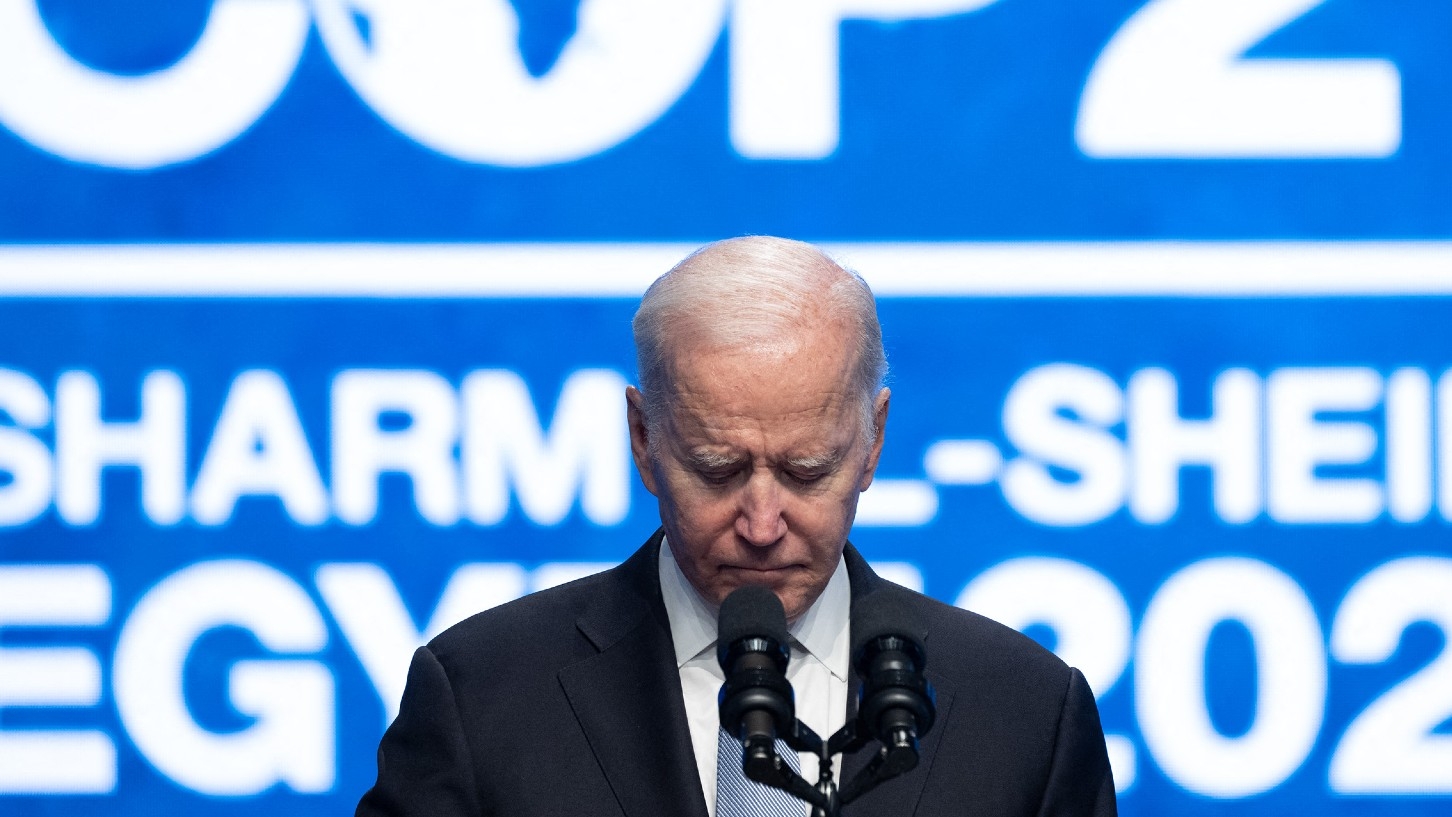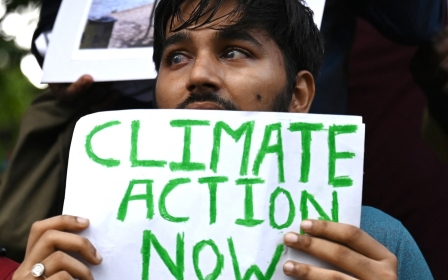Cop27: Biden says US to lead the way on climate, but lags on its own commitments

As US President Joe Biden attends this year's UN climate conference, Cop27, in Egypt, climate experts have expressed concerns that Washington needs to do more in order to complete the country's stated goals to help reduce global emissions levels and avert a looming climate crisis.
The leader of the world's biggest carbon emitter addressed the conference, being held in the Red Sea resort town of Sharm el-Sheikh, on Friday and said that global warming was posing an existential threat, promising the US would be on track to meet its commitments to fighting it.
'I don't see a path to a global solution on climate change unless the US leads the way'
- Cara Horowitz, UCLA
"I can stand here as president of the United States of America and say with confidence, the United States of America will meet our emissions targets by 2030," he said.
Yet experts told Middle East Eye that while the Biden administration has made great strides towards getting the US back in the right direction on addressing the climate emergency, the country is still not on track to achieve the emission goals it set for itself in the Paris Climate Agreement.
Scientists say global emissions must drop 43 percent by 2030 in order to limit global warming to 1.5 degrees Celsius above pre-industrial levels - the goal set by the Paris Agreement - but a United Nations report last week found global emissions are on track to rise 10.6 percent by 2030 compared with 2010 levels.
New MEE newsletter: Jerusalem Dispatch
Sign up to get the latest insights and analysis on Israel-Palestine, alongside Turkey Unpacked and other MEE newsletters
And while the US cannot force other countries to reduce their carbon emissions, the only way to avert a complete climate catastrophe is for the US to lead the way, Cara Horowitz, co-executive director of the Emmett Institute on Climate Change and the Environment at UCLA School of Law, told Middle East Eye.
"The US is the world's largest historic emitter and still one of the biggest," Horowitz said.
"Like much of the global north, it built its economy and wealth through fossil fuel extraction and burning. I don't see a path to a global solution on climate change unless the US leads the way, together with other major developed countries."
The Inflation Reduction Act
Coming into office, Biden reversed some of the previous Trump administration's policies that were disastrous for the climate. The president rejoined the Paris Agreement, an international and legally binding treaty signed by 196 countries, which aims to limit a global temperature rise this century well below 2 degrees Celsius above pre-industrial levels.
It further calls for efforts to limit the global average temperature increase to 1.5 degrees Celsius above pre-industrial levels.
In August, the US Congress passed the Inflation Reduction Act (IRA), a massive spending bill sponsored by the Biden administration that includes $369bn in funding to facilitate investments in clean energy and climate change resiliency.
Experts told MEE that the IRA is a significant boost to Biden's plans for reducing the country's carbon footprint.
'It's a bit late to be talking about the beginning. We should have acted a long time ago'
- Gernot Wagner, Columbia Business School
"The inflation Reduction Act, in fact, has supercharged domestic US greenhouse gas reductions. Emissions have been going down since 2005, but now the passage of the IRA has led to projections that look at something like minus 40 percent by 2030," said Gernot Wagner, a climate economist at Columbia Business School.
However, under the Paris Agreement, the US agreed to cut greenhouse gas emissions by 50 percent below its 2005 levels.
"In short, we are still not on track to meet that pledge, but we are much closer than we were before the passage of the recent climate bill," Horowitz said.
"We’ll need to use federal regulatory tools and measures at state and local levels to close the gap. It will be hard to do, but not impossible."
The difficulty for the administration to pass further measures on the climate is likely to increase if Biden's Democratic Party loses its majority in the House of Representatives. Midterm elections took place on Tuesday, and while the results are not yet final, analysts expect Republicans to gain a narrow majority in Congress.
"This administration is committed. They're not just words. They are definitely committed to the emissions goals that they laid out, the funding promises," said Noah Kaufman, who previously served as a senior economist in the Biden administration and now is a research scholar at Columbia University.
"The problem is that the administration has limited power. And it can only go as far as, in some cases, Congress is willing to go. And that has scaled back the ambition to some extent," Kaufman told MEE.
Wagner said that the passage of the IRA could be a turning point for the country to significantly reduce its environmental footprint.
"But of course, it's a bit late to be talking about the beginning. We should have acted a long time ago," he said.
US military emissions
Another issue when it comes to US carbon emissions is the country's military, whose greenhouse gas emissions rank higher than those of several entire countries, including Denmark and Portugal.
According to an estimate from Brown University's Cost of War Project, the US military produced around 1.2bn tonnes of CO2 emissions between 2001 and 2017, with 400 million of those tonnes directly attributable to the post-9/11 wars - in Afghanistan, Iraq, Pakistan and Syria.
The US military, with close to 800 bases in 80 countries around the world, is also the planet's largest institutional consumer of petroleum and, correspondingly, the single largest producer of greenhouse gases in the world.
The American military has decreased its emissions over the past two decades, but Neta Crawford, co-director of the Costs of War Project, has said it is not nearly enough.
Reparations: US comes empty-handed
One of the central points of this year's climate summit has been the issue of climate reparations, otherwise known as "loss and damage" in UN-speak.
Loss and damage funds have for the first time made it to the conference agenda, and less developed countries are continuing to demand their richer counterparts compensate them for the damage they have caused to the climate.
In the months leading up to the summit, the US had been pushing back on the issue of reparations being included in the discussions, and while several nations have already committed to varied amounts of loss and damage funds, Washington has remained silent.
A spokesperson for the Biden administration's climate envoy, John Kerry, said the administration was "anxious to see the loss and damage issue dealt with upfront and in a real way at the COP". Still, no strategy was offered on the issue by the United States delegation.
The US has also so far failed, along with other wealthy nations, to uphold its pledge to provide $100bn in climate financing to poorer countries.
"Basically, the US is standing there, almost empty-handed," Wagner said.
Wagner said that, in many ways, the administration was "doing fantastic work" in terms of aiding developing countries, "but there's nothing close to that sort of money committed that frankly is necessary".
Middle East Eye delivers independent and unrivalled coverage and analysis of the Middle East, North Africa and beyond. To learn more about republishing this content and the associated fees, please fill out this form. More about MEE can be found here.





